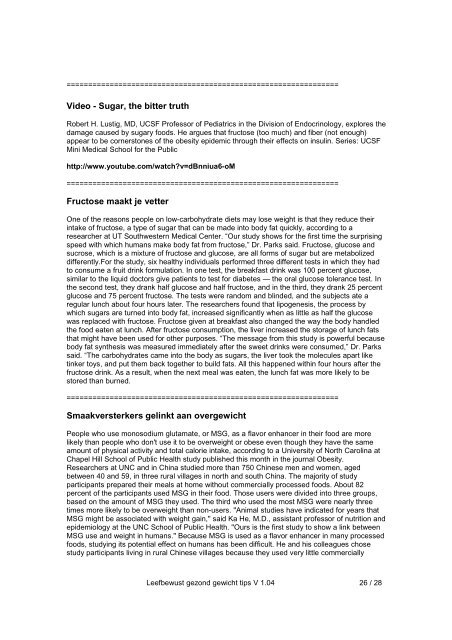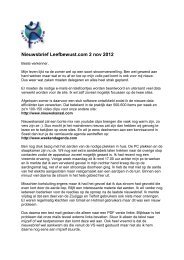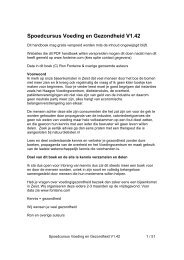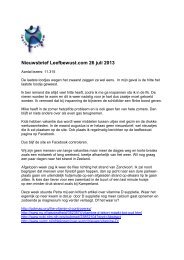Leefbewust gezond gewicht tips V 1.04 - Body & Fitness Forum
Leefbewust gezond gewicht tips V 1.04 - Body & Fitness Forum
Leefbewust gezond gewicht tips V 1.04 - Body & Fitness Forum
You also want an ePaper? Increase the reach of your titles
YUMPU automatically turns print PDFs into web optimized ePapers that Google loves.
===============================================================<br />
Video - Sugar, the bitter truth<br />
Robert H. Lustig, MD, UCSF Professor of Pediatrics in the Division of Endocrinology, explores the<br />
damage caused by sugary foods. He argues that fructose (too much) and fiber (not enough)<br />
appear to be cornerstones of the obesity epidemic through their effects on insulin. Series: UCSF<br />
Mini Medical School for the Public<br />
http://www.youtube.com/watch?v=dBnniua6-oM<br />
===============================================================<br />
Fructose maakt je vetter<br />
One of the reasons people on low-carbohydrate diets may lose weight is that they reduce their<br />
intake of fructose, a type of sugar that can be made into body fat quickly, according to a<br />
researcher at UT Southwestern Medical Center. “Our study shows for the first time the surprising<br />
speed with which humans make body fat from fructose,” Dr. Parks said. Fructose, glucose and<br />
sucrose, which is a mixture of fructose and glucose, are all forms of sugar but are metabolized<br />
differently.For the study, six healthy individuals performed three different tests in which they had<br />
to consume a fruit drink formulation. In one test, the breakfast drink was 100 percent glucose,<br />
similar to the liquid doctors give patients to test for diabetes — the oral glucose tolerance test. In<br />
the second test, they drank half glucose and half fructose, and in the third, they drank 25 percent<br />
glucose and 75 percent fructose. The tests were random and blinded, and the subjects ate a<br />
regular lunch about four hours later. The researchers found that lipogenesis, the process by<br />
which sugars are turned into body fat, increased significantly when as little as half the glucose<br />
was replaced with fructose. Fructose given at breakfast also changed the way the body handled<br />
the food eaten at lunch. After fructose consumption, the liver increased the storage of lunch fats<br />
that might have been used for other purposes. “The message from this study is powerful because<br />
body fat synthesis was measured immediately after the sweet drinks were consumed,” Dr. Parks<br />
said. “The carbohydrates came into the body as sugars, the liver took the molecules apart like<br />
tinker toys, and put them back together to build fats. All this happened within four hours after the<br />
fructose drink. As a result, when the next meal was eaten, the lunch fat was more likely to be<br />
stored than burned.<br />
===============================================================<br />
Smaakversterkers gelinkt aan over<strong>gewicht</strong><br />
People who use monosodium glutamate, or MSG, as a flavor enhancer in their food are more<br />
likely than people who don't use it to be overweight or obese even though they have the same<br />
amount of physical activity and total calorie intake, according to a University of North Carolina at<br />
Chapel Hill School of Public Health study published this month in the journal Obesity.<br />
Researchers at UNC and in China studied more than 750 Chinese men and women, aged<br />
between 40 and 59, in three rural villages in north and south China. The majority of study<br />
participants prepared their meals at home without commercially processed foods. About 82<br />
percent of the participants used MSG in their food. Those users were divided into three groups,<br />
based on the amount of MSG they used. The third who used the most MSG were nearly three<br />
times more likely to be overweight than non-users. "Animal studies have indicated for years that<br />
MSG might be associated with weight gain," said Ka He, M.D., assistant professor of nutrition and<br />
epidemiology at the UNC School of Public Health. "Ours is the first study to show a link between<br />
MSG use and weight in humans." Because MSG is used as a flavor enhancer in many processed<br />
foods, studying its potential effect on humans has been difficult. He and his colleagues chose<br />
study participants living in rural Chinese villages because they used very little commercially<br />
<strong>Leefbewust</strong> <strong>gezond</strong> <strong>gewicht</strong> <strong>tips</strong> V <strong>1.04</strong> 26 / 28







